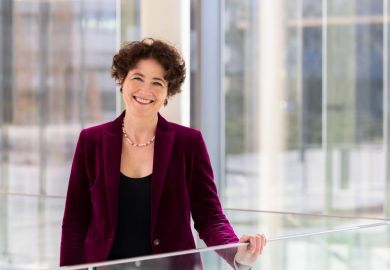“There has been too much negativity – people need some hope that this will go away,” explained Karol Sikora on why he is determined to keep offering an optimistic expert voice on coronavirus.
His upbeat tweets on why the virus may be “getting tired” and how, based on his analysis of scientific literature, the UK’s lockdown measures should be eased have certainly proved popular: since joining Twitter on 6 March, the 71-year-old dean of the University of Buckingham’s medical school has acquired 270,000 followers, more than many of Britain’s best-known academics have accumulated in a decade (classicist Mary Beard, who joined in 2010, has 263,000 followers).
Indeed, few academics have stirred social media in lockdown in the same way as Professor Sikora; a recent tweet on 27 May criticising the ban on meeting family members in gardens as having “no scientific or logical basis” was liked 31,000 times within 24 hours, while a video he posted on antibody immunity was viewed more than 500,000 times.
But his decision to embrace the role of “The Positive Professor” – the title of his new weekly column in the Daily Express, which bills him as a “voice of calm” offering “soothing advice in troubled times” – has been controversial.
ITV’s Good Morning Britain host Piers Morgan, the nation’s most vociferous lockdown champion, has mocked his “relentless positivity” in exchanges with the former director of the World Health Organisation’s cancer programme, while others have accused him of peddling “blind optimism” and “false hope” to a nation desperate for normal life to restart. Others have, however, praised his sunny responses to the “doom-mongering” and “alarmist” media coverage, with some calling for him to be knighted.
“I read, where possible, all of the comments on my tweets and some come from very unpleasant people – they see it as a type of gladiatorial contest,” reflected Professor Sikora.
“I wonder how some of them find the time to make so many comments,” he continued on the vitriolic remarks that often accuse him of being indifferent towards coronavirus victims, risking a second wave of infections or being driven by corporate interests linked to the private cancer therapy centres he runs.
“My agenda is to get cancer services moving – both private and public,” Professor Sikora told Times Higher Education, pointing out that 60,000 UK residents a month are usually diagnosed with cancer, but numbers were significantly down as people steered clear of hospitals. “There is a risk that more people could die of cancer [than] from coronavirus,” he continued.
That fear of a massive spike in cancer deaths, precipitated by what he sees as overly alarmist public health messaging, is why he joined Twitter, Professor Sikora explained, adding that he was urged to do so by a friend who had “a massive 77 followers” and has been “amazed” by the reaction to his posts.
“I was getting incensed, as I could see where things were heading, which was Covid-19 taking over the whole NHS,” said Professor Sikora on the closure of NHS cancer wards to free up capacity for coronavirus patients. “Whether we can pick up cancer services in time remains to be seen.”
Professor Sikora’s regular reminders that, in his view, the virus is showing signs of petering out regardless of a country’s lockdown measures have been particularly controversial, as has his prediction that a second wave of infection may not happen.
“There is a fear of a second wave but do we continue a lockdown that means people cannot go on holiday or children cannot go to school? – other countries which have eased lockdown haven’t seen this second wave,” he explained, adding that there is a plausible and “optimal situation where nothing happens and the virus simply goes away.”
“It’s early days since we’ve come out of full lockdown, but it’s encouraging that we haven’t seen a second wave – of course, that doesn’t mean we shouldn’t plan for one,” he said.
With coronavirus deaths and infections continuing to fall, Professor Sikora said he now wants other academic experts to join him in reassuring the public about the threat of coronavirus.
“People are not coming out of Covid-19 mode as the government propaganda has been so powerful and people are frightened,” observed Professor Sikora, who said he was “surprised by the silence of my colleagues in academia” regarding the receding threat of the virus.
Without more expert voices to encourage people to resume normal life, fear over coronavirus could wreak more misery, suffering and death than the virus itself, he warned.
“The rich will get through this, but it will be the poor who are most severely affected – we need to get out of this mindset and get health services and the economy motoring,” he said.
Register to continue
Why register?
- Registration is free and only takes a moment
- Once registered, you can read 3 articles a month
- Sign up for our newsletter
Subscribe
Or subscribe for unlimited access to:
- Unlimited access to news, views, insights & reviews
- Digital editions
- Digital access to THE’s university and college rankings analysis
Already registered or a current subscriber? Login








